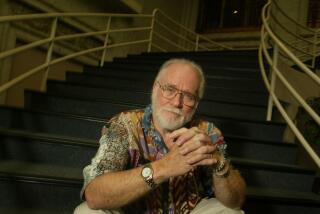Gil Cates: an appreciation
Los Angeles has lost one of its most unrelenting champions of theater.
When the news broke on Tuesday morning that Geffen Playhouse founder and producing director Gil Cates had died at 77, it was as though the unthinkable had happened, something akin to the Hollywood sign tumbling down from its hillside perch.
Perhaps it’s inevitable to connect Cates with Hollywood. A stage director who also had a successful career in TV and the movies, he was the go-to producer for the Academy Awards telecast for a number of years, a role that gave him the air of the consummate studio insider, even if in his heart of hearts he was too much a theater person to feel totally at home swimming with the sharks.
Not that Cates, whom I got to know better than any other artistic director in town since I joined The Times in 2006, wasn’t skilled in the oily arts of celebrity glad-handing. He was so adept at schmoozing, in fact, that it hardly mattered how obvious his ulterior motives may have been. Like many people who make a disproportionate impact, he was a character, and the great joy of being in his company was seeing him perform his role on whatever impromptu stage was available to him.
The two of us used to have lunch every year at — where else? — the Grill on the Alley in Beverly Hills. An industry watering hole, it was a convenient meeting place for both of us and, of course, everyone there knew him. Agents, studio bosses, publicists and those with Hollywood connections too long in the past for me to place would pay their respects as Cates filled me in on his plans at the Geffen while sneaking in feedback on my performance as critic.
The lunches were usually quite long, two-hour affairs at the very least, filled with chat, some of it contentious but most of it intent on drawing out the other’s experience. Cates wanted me to understand the challenge of his mission, how difficult it was to get prospective theatergoers in this town to become actual theatergoers — those blessed souls willing to plunk down a credit card in exchange for an evening of traffic, parking and a play that, however madly it’s hyped, is something of an entertainment risk.
On this topic, a missionary zeal would creep into his manner. He tried to convince me that, no matter how much I might find a show to be worthless, it was important for me to start gently and respectfully. He wasn’t asking me to bury my opinion, but he thought it was possible to be candid without discouraging the rest of civilization from attending. Differences of opinion are the norm, he’d argue.
He was, despite the battle weariness that began to show more with age, an eternal optimist. He understood my rebuttal, boiled down to the idea that if I wrote reviews with a concern for box office that the writing would be tepid and the verdicts unreliable. But he wanted to heighten my awareness of the impact of my language. He succeeded in the sense that I came to include him in the imaginary readership that accompanies me as I proceed the morning after an opening to knock out a review on deadline.
Mind you, he wasn’t always happy with the result or shy about letting me know it. (The reverse was also true, and his compliments were never general but always tied to something he thought deftly handled in the prose.) One review in particular really ticked him off. It came shortly after a pan I wrote of “Matthew Modine Saves the Alpacas,” in which I asked whether anyone at the Geffen was “capable of making an objective assessment of a script that should have gone no further than a benefit reading with a carefully planned guest list?” That query was met with silence. A week later, however, I filed what I still regard as a tough but on-point response to the UCLA Live production of “Medea” starring Annette Bening. Cates went ballistic, firing off a letter to my editors that said I had lost my way as a critic.
We didn’t have lunch for many months after that, but when we did — after Bening had opened later that season in “The Female of the Species” at the Geffen, another work I wasn’t wild about — we talked about the incident. I told him that I thought his note had been unfair, that I certainly had no animus against Bening (whom I have lauded extravagantly in the past), and that it was unreasonable to expect that I would dance around my negative opinion just because a big-name actress was willing to do the classics in her own backyard, an admittedly rare and courageous act.
We heard each other, but only after enough time had passed. We talked about the sting of criticism. I shared with him what it’s like to be a reviewer in the age of the no-holds-barred blogosphere; he told me what it’s like to produce a play that fizzles, then to be accosted in the lobby of his apartment building by neighbors who feel impelled to vent their disappointment to him.
Cates was in perpetual search for a formula that would get Los Angeles — heck, he would have settled for the Westside — excited about theater. The nexus between “the biz” and the stage was a no-brainer for the man who not incidentally also founded the UCLA School of Theater, Film and Television. Stars attract, and only a fool would ignore such potent local resources, though an overreliance on this strategy allowed certain factions of the local theater community to hold Cates in dubious regard.
He cared too much about serious drama to deserve their condescension. If he could have programmed a season of nothing but Tennessee Williams, Arthur Miller, David Mamet, Donald Margulies and Jane Anderson, he would have been perfectly content. But bringing together the right collaborators at the right time is an elusive calculus. And getting people to buy tickets for ambitious work is an even thornier branch of mathematics.
Failures — and there were plenty of them — didn’t deter him. Accomplishments, such as the opening of the Geffen’s intimate Audrey Skirball Kenis Theater, spurred him on. When I broached the subject of retirement, he confided that he wanted to leave only after putting the theater on sound financial footing. He whispered his plans for increasing the theater’s endowment. The Geffen would be his legacy, and like a responsible father, he wanted to make sure that nothing would imperil the future of what he left behind.
Death inevitably brings regrets. I had sent an email to an editor in September commenting on how the Geffen’s season shows “more risk, more vision” than the competition. This was after the opening of “The Elaborate Entrance of Chad Deity,” a play that boisterously challenged the proscenium divide between the house and the stage. I was waiting to see more of the offerings before writing a notebook that held Cates up as an example to his fellow artistic leaders, who have increasingly been pursuing a more commercial course.
What appealed to me about this piece was the way it would have overturned assumptions about Cates’ flashy image. It was no secret to those who knew him that underneath the brash Hollywood veneer was a wise mensch. If any theater people continue to doubt it, they should try to imagine this city without his drive, ingenuity and sheer doggedness. What higher praise than to note that, as a result of these attributes, Los Angeles remains in his cultural debt.
More to Read
The biggest entertainment stories
Get our big stories about Hollywood, film, television, music, arts, culture and more right in your inbox as soon as they publish.
You may occasionally receive promotional content from the Los Angeles Times.







